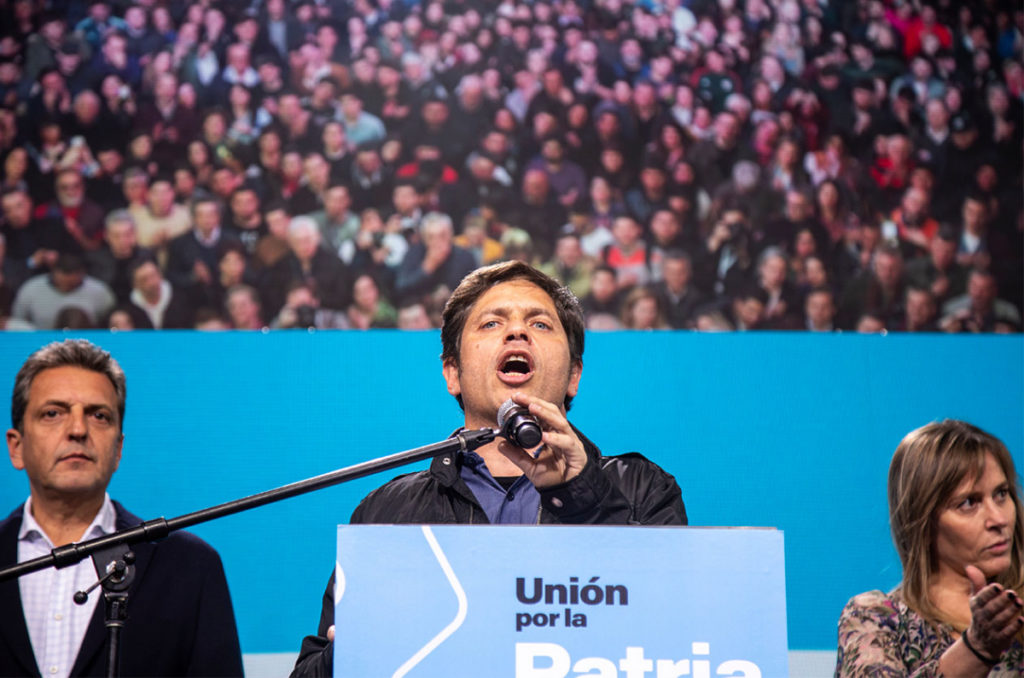Let us begin this urgent text with a fascinating paradox: the PASO (Simultaneous and Mandatory Open Primaries) are the instrument invented by the political system to avoid fragmentation and generate greater stability in the system through the consolidation of “the offer”, that is to say, its concentration in a few options.
A kind of set-up from above to enclose the cattle in certain predefined pens. However, once again the shot backfires and the Primaries end up being the opportunity for the deep malaise that accumulates in society to express itself with all its corrosive force and in a surprising way. A kind of desperate cry for change, saying, enough!.
Faced with this manifestation, which occurred in 2019, was repeated in 2021 and Sunday night was expressed even more clearly, there are two very different attitudes. One is to do the impossible to shove the popular expression in a cone of silence trying to reduce damages, to try to not let the echo spread and to make a weak appeal to make this sector reconsider. The other is to be faithful to the deep meaning of the word democracy (the people are never wrong) and concentrate on deciphering the message of the ballot boxes with great attention, without fear, without putting one’s own interests first, and with the greatest intellectual sincerity possible. Let’s go down this second path.
They all must go
The first relevant fact of this election is the record increase of “non-positive” votes, i.e. blank ballots or no participation (voting is mandatory in Argentina), since the PASO were installed in 2009. If we compare the four presidential elections that have taken place since then, the decrease in the total number of affirmative votes (votes for a specific candidate or party/coalition) is impressive: from 24.3 percent that add up the figures of abstention, blank vote and contested votes in 2011, we went to 36.5 percent in yesterday’s Primary, above the 33.3 percent that had been verified in 2015 and 30.3 percent in 2019. If in 2011 the number of voters who did not choose anyone was 7,434,542, barely half of those obtained by Cristina Fernández de Kirchner to achieve her brand-new reelection, in 2023 that figure reached 11,952,064, and was in first place far ahead of the winning libertarian.
We are facing the proliferation of what we propose here to call the “disaffected citizen”, which does not linearly coincide with those who do not exercise their right to vote but explains at least part of this growing trend. Disaffection is the highest stage of discontent, as it goes beyond the punishment vote (directly aimed at questioning the incumbent ruler) and even the angry vote (which expresses disagreement with the totality of the offer), to express something like a disconnection with respect to the very logic of political representation. They choose not to believe. They no longer expect anything. Perhaps many of them define their vote at the last minute, but they are governed by parameters that have nothing to do with ideological or programmatic deliberation. To reconstruct the link between these people and the collective decision of common affairs requires a profound reset of the political system.

Rock and roll
The second key aspect is the emergence, in the double sense of the word emergence, of a new political force that in barely two years became the most voted at the national level, despite all forecasts and against the wishes of the local establishment. The phenomenal triumph of Javier Milei and Victoria Villaruel undermines those who made fun of their poor provincial performances, without taking into account something obvious: libertarianism is in tune with the widespread popular uneasiness. And he wins all the political discussions he faces, putting his rivals on the defensive and proposing what the majority of the population seems to desire: a decisive change of course, a different future capable of giving hope.
This gigantic boost of electoral legitimacy now gives the ultra-liberal leader an immediate power to influence the course of events, which was instantly verified with the devaluation of the official dollar adopted by the Central Bank. All the momentum is in his favor. If he does not make mistakes, his path to the presidency could be unstoppable. The big question is whether he will need to destabilize the current government in order to achieve this march towards the Casa Rosada. And if so, whether he will be able to put this desire into practice. The main political battle, therefore, may be fought before October.
Give the people what they want
The defeat of the ruling party looks inevitable, in spite of the signs of astuteness that its main leaders emit when insinuating that the three thirds scenario could favor them, by a rare electoral twist. The truth is that Peronism went from 12,200,000 votes in 2019 (47.79%) to obtain 7,058,830 (32.43%) in 2021, to hit bottom Sunday night with less than 6,500,000 adherents (27.27%), which means a decrease of almost half of the electorate in just four years, while being in power. But if we focus now on the so-called “unity candidate”, the bleeding is even more eloquent: 7 million votes thrown away, and a massive drop from the heights of having won half of the electorate to barely scraping by with 20%, one fifth of the votes at stake. Less numerical data shows to what extent Peronism faces a far-reaching dilemma: for the first time since 1945, that is to say, since its birth, Peronism came third in a presidential election.
Three snapshots illustrate the crisis of the three currents that made up the coalition in 2019. Take 1, President Alberto Fernandez voting alone and emaciated at the headquarters of the Catholic University in Puerto Madero, neighborhood of the postmodern Buenos Aires oligarchy. Take 2, the wife of the presidential candidate Malena Galmarini lost the Peronism internal in her own hometurf, highlighting the degree of complexities of massismo (the current of Sergio Massa, candidate for the peronist Union for the Homeland). Take 3, Kirchnerism was defeated for the first time in the governorship of Santa Cruz (Nestor Kirchner’s homestate and where he developed his political career) and lost the presidential contest in the province to Milei, an affront very difficult to digest for the Penguin legacy.

Short life of Macrismo without Macri
The irruption of La Libertad Avanza also left the traditional opposition coalition in intensive therapy. Juntos por el Cambio is another one of Sunday’s losers. In spite of having obtained the second place, its place in the eventual run-off in November is seriously threatened. However, within this force there are clear winners and thunderous failures. Among the former, former President Macri stands out, not only because he managed to retain the home district through his cousin, not only because he celebrated the triumph in the internal primaries of his most like-minded candidate, but also because his hypothesis that the social consensus to impose a serious liberal transformation seems to have been confirmed by the vote.
As for Patricia Bullrich, the triumph against the electoral machinery of her opponent makes her one of the figures with more projection in the political scenario to come, but perhaps she has come out of the election with less possibilities of becoming president than before. Perhaps because she lacked a reasonable calculation to gather the votes she would need to reach the second round, she may end up becoming an ally of Milei in the task of demolishing what is left of the government.
The biggest loser of the 2023 primaries was Horacio Rodríguez Larreta. The one who had the best electoral tool and inexhaustible economic resources, who most analysts thought was almost certain to be the next president, got only 11% of the votes. It would not be too risky to predict, even in a country where everything comes back and is recycled, that we are facing the end of the political career of the cold management machine, the hero of the moderates. Surely he will continue to be a civil servant and will participate in future elections, but he has lost the possibility of being the driver of his own project. A mouse has surrendered at his feet.

Breaking down the wall
The sum of the votes won by Massa and Larreta, the two professional politicians par excellence, the geniuses of the thread, the favorites of the red circle, the rivals who run to the center to finally kiss each other, barely exceeds the figure reached by the crazy clown [Milei]. If this election seems to show anything, it is that the rift cannot be reconciled from above, building bridges high up, but that the way out is through the side, in a sort of exodus from what would be politically correct. The problem is not the lack of agreements, but the nature of the existing positions of consensus that make any outcome impossible, regardless of the coalition.
For the popular and progressive forces, this election has been a very tough blow. The worst fears have been confirmed: the ultra-right draws its potential from young voters, also among the impoverished sectors, even in the peripheral territories, because it manages to represent the rebellion against the existing order, clearly unjust. The role that we have not wanted or have not known how to assume is being exploited by a narrative of the worst kind. Cristina Fernandez once said, in the best moment of the Kirchnerist cycle, that to her left was only the wall. This formula has prevented the emergence of a political will capable of facing with coherence and lucidity the bad Peronist government. The campaign and the result obtained by Juan Grabois and Paula Abal Medina have evidenced the need to break that containment wall. The immediate task is to prevent the arrival of the ultra-right to the government this year. To relaunch a project of resistance and creation, whose loyalty is tied to the effective happiness of the people, beyond any calculation of governability or sectorial political benefit, is both urgent and important.
This article was written by the Editorial Collective of Revista Crisis and was first published in Spanish there.





